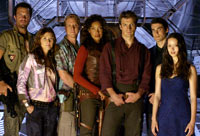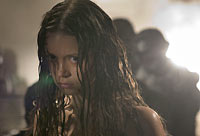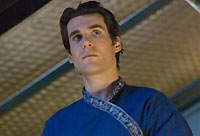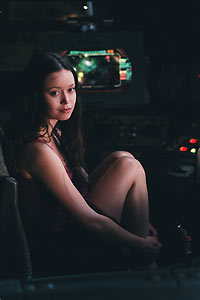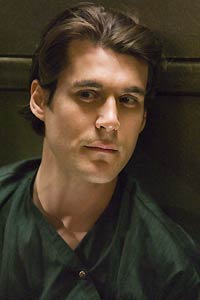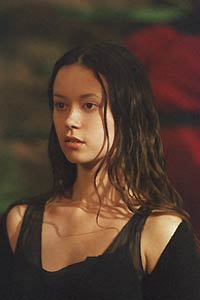|

THIS WEEK'S COMPETITIONS
|
|
 |
 |
|
|
THE 'SERENITY' INTERVIEWS - PART 2
Summer Glau and Sean Maher
Interview
by Johanna Juntunen - LA, September 2005
Q: Are you surprised to be back; from a cancelled TV show to the big
screen?
Summer
Glau: It just surprised me, the scale of it. Joss told us from the moment
the show was cancelled that he was going to find a way to keep telling the
story but we didnít exactly know what that meant. So here we are.
Sean
Maher: The actual day we got cancelled we all went to Nathanís house and
he (Joss) said that he would not rest until he found a home for us. So we
believed, we never got the official ďitís deadĒ so the result is this
lingering sense of hope. But like Summer said (laughs) we never envisioned
it to be this big movie, and now to have finished it and out thereÖthe
response has really been wonderful, so itís continually surprising.
Q: How did you take the bad news about the showís cancellation?
SG: It was
a shock.
SM: A
blow, it was devastating.
SG: It
took us a while. When we got cancelled it was right before our holiday, so
we didnít even get a chance to let it settle. We went to Nathanís house
and we were together for the one last time and then we all went home for
Christmas, so it was just a shock.
SM: We
werenít sure what was going on with the network, we were struggling, so we
were on pins and needles for a while. But that takes you by surprise, it
was so abrupt.
Q: What is so unique about this material that it deserves to be on the big
screen?
SM: I
think itís the characters. Just this world that Joss created, people seem
to be captivated by it. From the very beginning people who saw the show
loved it, this sort of bubbling small group was always there from the very
beginning, they were the driving force that inspired us and kept us going,
because we knew that there were people out there that really liked it.
Then the show is cancelled and the DVD sales went through the roof, so
itís apparent that still people were catching on to it and loved it, so
there should have been another venue to tell the story again. And Joss, I
think, was sort of a miracle worker in a sense that he kept it alive and
fought so hard for this. Itís really his baby.
Q: Is it different for you actors when it was a TV show than when it was a
film?
SG: Not as
much as we were preparing for. Everyone was saying that this was going to
be so different, but our dynamic was already set up from when we worked
together and when we worked for Joss. So when we went to set to do the
film, the things that were different were not us. Itís was more like the
sets were bigger, we had more money, and more time.
Q: What time frame did you have to shoot each episode?
SM: Eight
days, and then we had three months to do the movie (laughs). It was a
little bit different.
Q: Was it more physical?
SG:
Absolutely for me. And I think for everyone, for Sean, he ended up getting
in there and fighting the battles too. But I trained for three months
before we even started shooting anything.
Q: Was there anything they told you to do and you thought Ďno wayí?
SG:
(laughs) The split on the ceiling, but we got up there and we did it. When
I was up there it didnít hurt. There was a guy who was helping me, and
they had to rebuild the hallway three times because they had to measure my
legs. If itís off an inch I canít hold my leg up. So I would get in a
split and get situated and I stood up there between takes. It was easier
than I thought.
Q: Did your co-stars attempt to do it?
SM:
(laughs) I had to show her how to do it. She had to learn it from
somebody.
Q: What kind of training did you go through?
SG: I met
my stunt coordinator, Chad Stahelski, months before we started and he
watched me move, he taught me some different steps and stuff, and he saw
that I was a ballet dancer. He created a kind of hybrid technique for me
that was a more ďballeticĒ way of doing martial arts. He said that it was
a combination of wuchu, kung-fu and kick boxing. And it was very different
from dancing (laughs). I worked hard, we all worked hard.
Q: Did you keep the workout going after the movie?
SG: You
know, they offered to let me keep coming to the class and I said no
(laughs).
Q: Did you get injuries other than bruises?
SG: Oh,
yeah. I have a big scar on knee from one stunt going wrong, and I pulled
every muscle in my body - dancers are very strong but itís a completely
different kind of muscle memory. Martial arts is kind of like a snake: it
snaps and then it comes back in. Dancing is always up, always lifting and
itís very fluid. I can hold my leg out for a long time as a dancer, but in
martial arts you have to get your leg up that high but you have to get it
down in one second. So I kept pulling hamstrings, I was limping home, Iíd
do ice baths where I just had to carry ice bags home and lie in a bathtub
because I pulled everything. My body really changed a lot. And I was a
vegetarian and I ate meat by the end of the movie. I was eating steaks
(laughs).
Q: What was the most difficult sequence to shoot?
SG: The
storage locker was hard for me to do.
SM: Yeah,
the storage locker was hard. The end of the movie was definitely most
grueling schedule-wise, we shot that for days and days. But emotionally,
probably the storage locker.
SG: And
also the mule chase because we were actually in the mule and then it was
green screen. They made this incredible rig and we all sat up there in the
desert for days and days and shot that mule chase. The boys loved it and
the girls wanted to get out of the sun.
Q: Was it easier to shoot the TV show or the film?
SM: I
liked the film. Theyíre so different, obviously our schedule, it was eight
days versus three months. Sometimes for the episodes we didnít get scripts
until the night before so it was difficult to get a chunk of dialogue that
we were shooting the next day, but itís just TV versus film. But the film
was fun for me, because I felt that all the ground work was done, we had
this incredible foundation because we had been working together as actors
and we had been with these characters for so long. That, I think, is the
hardest part to find. You find who your character is, how he walks and
talks, and how he is with the other actors. So all that was done and we
just stepped back into those shoes. There was a great sense of ease to it.
Q: Was there any improvising or was Joss not allowing it?
SM: No, we
pretty much...maybe we finish his words and if itís rolling and if he
likes what goes on afterwards weíd do it.
SG: Iím
not that brave. I always do just what Joss says.
Q: Do you have siblings?
SG: I have
two sisters.
SM: I have
a sister and a brother.
Q: Does that feeling just instinctually kick in when you have to play
close siblings on screen?
SM: It
does, you obviously draw from your own life. You find similarities between
yourself and the character, and they bleed into the way you portray the
character.
Q: You have tremendous patience for your sister?
SM:
(laughs) Yeah.
SG: Poor
guy.
Q: Did you always know that you wanted to get into acting or did it just
happen?
SM: I
picked it up in high school where we had a great theatre program. Towards
the end of my senior year we were putting up like six shows a year, and
then I went to college to study drama. Right out of college I started
pursuing it and Iíve been blessed that Iíve been lucky enough that things
worked out.
SG: I was
going to be a ballet dancer all my life. I started dancing full time when
I was fourteem, and I had some really bad injuries, one in particular when
I was nineteen. It would not heal. I was really stubborn, I would not give
my roles to anybody so I kept dancing. Finally I just couldnít take class
anymore, and I had to admit that I had to stop dancing classical ballet.
So I came to L.A. for a summer, basically following a crush that I had out
here and he ended up moving to New York the minute I got here (laughs). So
I started auditioning for anything, and found that, I guess, I could act
and maybe I could get work doing that. And I had this secret feeling when
I was a little girl that I was going to end up acting. So it felt right.
Q: What kind of message do you want the fans to pick up from Serenity?
SG: One
thing that we keep talking about is believing - whatever you believe, you
have to believe it with your whole heart. Thatís one theme that keeps
running through. And love. Taking care of the people around you, taking
care of the people you love, itís simple. There are many layers and
everybody that comes to see it feels something different when they walk
away.
SM: What I
love about the world of Firefly, the world of Serenity, is
itís five-hundred years in the future but thereís this big Ďwhat if?í,
like, what if we used up the resources of Earth and here we are, people
are trying to survive, trying to get by, trying to just eat and get a job.
There are these dynamics between these wonderful characters and I think
the movieÖyes, itís this huge spectacular, great ride and when you really
think about it, for me it instilled this faith in humanity that like yes,
500 years in the future we have this Alliance trying to do this horrible
thing to this girl and trying to just change people, and at the end of the
day itís like ďOK, letís just have faith.Ē There is innate goodness and
people will prevail as human beings and thereís just wonderful sense of
humanity to it. No matter how far in the future you go, hopefully people
are people in how they work and function together. We are trying to
rebuild and figure things out, and make adjustments.
Q: Does being a ballet dancer benefit you in acting?
SG: The
thing about River that I like, is that she doesnít have a lot of lines.
Especially in the series she had to show what she was thinking just by the
way she moved or by how her face was moving. I think that has helped me a
lot as an actor. I still have hard time sometimes, expressing my anger
with words, Iím better at moving and being in a room and showing how I
feel that way. Itís a thing that I had to work on because I was very shy
as a kid. I think thatís why I love dancing, because I felt that people
were watching me but I didnít have to connect with them. They were out
there and I could feel that they were watching me but I didnít have to
look at them. Now with acting itís very therapeutic for me, having to
actually say and communicate.
Q: Can you talk about what makes Joss Whedon so special?
SM: Heís
just this incredible man, heís really a wonderful guy, a friend and a
mentor. The instant I met him, because there was no script with the pilot,
there were like a few pages of sides, like one scene, and I really liked
the scene and sat down with Joss. And instantly I was so intrigued. I
really wanted to work with him. And it just continually grew, like every
time on set, watching him work, everything he said was so smart. I felt
that I was being steered into the right direction. Heís this incredible
ring leader.
SG: If you
stand by him on set for ten minutes you realize every detail that runs by
him, you realize how special, creative and patient he is. He is kind, and
he speaks well to everybody. He gave me what I have now in my career, he
cast me in my very first TV show, he believed in me when nobody believed
in me. He saw something that other people were not seeing. Heís my hero in
a way. Iíll never forget what heís done for me.
Q: When the DVD sales of Firefly went through the roof did it give
you hope or was it just a consolation prize?
SM: For us
it was a reassurance that everybody was out, it was inspiring to us. To
executives and people in suits it was like ďoh, look at that. There are
people, this could be successfulĒ. I think it was a great tool for people
who hadnít had the chance to see the show. There were fans of the box set
and they passed it around, and it spread sort of word of mouth in that
regard.
Q: Whatís happening next with you, are you hoping for a sequel?
SM: Sort
of.
SG: We
have to see who comes to see it.
Q: What are your expectations of the movie?
SM: I read
somewhere, in Entertainment Weekly or Us Weekly, that
Universal said that they are entertaining the idea of part two if we make
$80 million worldwide. I think weíre all hoping but nobody wants to talk
about it the possibly there will beÖbecause thereís nine of us and there
are so many which ways the story could go. But you never know, I donít
even know if Joss has an idea for part two, he hasnít shared it with me.
But we know the fans love it and I know that people who are not familiar
with the series and check out the movie are reallyÖitís a wonderful
response. Iím just hoping that people see it.
Q: Was there an alternative ending with you dying?
SM: No. I
think he says he thought about it.
SG: God!
Q: But you were needed for the sex scene?
SM: Yeah,
part two will be all sex.
Q: Do you collect DVDs and what are your favourite ones?
SM: I have
a very small collection. A Streetcar Named Desire was my first DVD
gift which I like.
SG: I
donít collect them, no. Most of my favourite movies havenít come out on
DVD yet, I like all the old stuff. My favourite is Camelot, the
musical (laughs) with Richard Harris and Vanessa Redgrave. I have the old
box set.
The 'Serenity'
Interviews - Part
3
Serenity is
released on DVD on February 27th.
Interview courtesy of Universal Pictures.
Previous Zeta Minor News entries can viewed
here.
|
|



